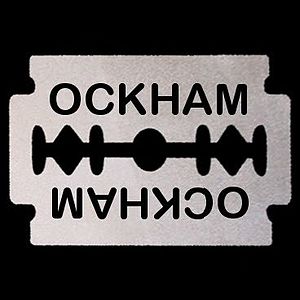Ockham's Razor: the simpler the better.
Ochkam's Razor was so named in the mid-1850s, alluding to the english philosopher and franciscan friar born in 1275, Guillaume d'Ockham who, in turn, was thus baptized by the village south-west of London where he was born, as was common in season.
The loan of names, however, would be unnecessary since the concept developed by Guillaume was not unprecedented and even had another name. Historians have revealed that the idea already appears in Artistotle's writings, dating back to the time of Ancient Greece, with the latin name of Lex Parsimoniae, something like Principle of Parsimony.
Regardless of the name, it is interesting to note that Aristotle and Ockham belonged to different doctrines of philosophical thought (greek was realistic, and english was nominalist), yet they both used a logical principle which, in very general terms, argues that 'the correct solution for an issue is almost always the simplest possible', that is, the one that involves fewer factors.
If the term 'Ockham' comes from the city of its creator, the word 'Razor' comes from this assumption of cutting off all that is surplus, in the word of the philosopher, all 'entities' that contribute nothing to the formulation of a hypothesis richer than the simplest possible, given the observed facts.
Long before they knew Newton's laws or the principles of thermodynamics, philosophers argued that "nature is economic in nature", in seeking a solution to a problem, it usually chooses the easy way out. It was not for nothing that my chemistry teacher used what we called the 'Maximum Laziness Law' to explain to us that the equations should always be balanced and simplified as much as possible to be correct.

Problematizations
From this 'discovery' both Aristotle and Ockham used this logical principle broadly in their philosophical arguments - the second even more than the first. And so, of course, both were criticized for being "oversimplifying things".
In Ockham's case, even though he was a member of the church, he was accused of "cutting" from his explanations precisely the existence of God. That's because at that time, as well as in all other times, people were not able to logically explain various phenomena, from rain to death. Thus, eac one ended up formulating his own hypotheses or believing one of those presented to him, and of course one of the most common was to attribute the occurrence of these phenome to "the will of God".
When the philosopher, however, says that "entities should not be multiplied beyond what is necessary", he basically argues that hypotheses which presuppose the existence of a complex, unverifiable, omnipresent, omnipotent, omniscient entity should not be taken into account to explain events that can be properly explained by other, simpler hypotheses.
When confronted by this reasoning, Ockham hesitated. He did not want to deny the existence of God and proceeded to argue that God could choose a more complicated path for some phenomena if he wished, but that men in their theories should always eliminate superfluous concepts.
But the damage was done.

Applications
Ockham's Razor is not a law of science, that is, it does not claim to affirm that what is right and what is not under any hypothesis, so it does not argue that the most complex hypothesis must always be refuted. On the contrary, the Razor ia a methodological principle that, formulated from the observation of the 'economy of nature', defends that it would be energy saving from the simplest hypothesis because this, almost always, will be the true one. This was how it came to serve as the basis for the creation of the so-called scientific method.
In practice, the Razor serves to cut out of our lives hypotheses that we like to create to make things more complicated than they need to be, often trying to reinforce beliefs that we already have or deny our contradictions.
If there is a simpler logical explanation than your theory and if this explanation gives account of all the facts presented then it is quite likely that it is right and you wrong. Now, if after a first round of checking the facts presented, you find some loose end in the hypothesis that is posed then, okay, maybe we have to stop to think of a slightly more complex thesis.
But here among us, this is not the case with flat earth theories.
Antoine de Saint-Exupéry
Perfection is not achieved when there is nothing more to add, but when there is nothing else that can be withdrawn.
Leonardo da Vinci
Simplicity is the ultimate degree of sophistication.
Albert Einstein
Everything should be done in the simplest possible way, but not simpler than that.